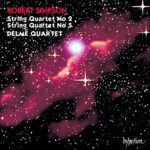
MARBECKS COLLECTABLE: Simpson: String Quartet No 2 & No 5
 $30.00
Low Stock
add to cart
$30.00
Low Stock
add to cart
ROBERT SIMPSON
MARBECKS COLLECTABLE: Simpson: String Quartet No 2 & No 5
Delme String Quartet
[ Hyperion / CD ]
Robert Simpson's first three quartets date from 1951 to 1954 and form a natural sequence, both in terms of musical expression and tonality. No 1 displays the principles of 'progressive' or 'emergent' tonality; it moves from E flat to the opposite pole, A, where it concludes with an innocent, almost Haydnesque little dance. In a sense, Quartet No 2 begins where No 1 left off, with a happy dance-like tune, but this is attacked by inimical forces, which it fails to surmount. Whereas No 1 moved from one key to another, No 2 goes only from A major to A minor, and ends in darkness. The whole Quartet is dominated by a single pulse, over which different tempi are thrown. This idea, first introduced in late Sibelius, has proved to be of considerable importance to Simpson's creative thinking, from his First Symphony onwards, culminating in the vast structure of the Ninth some thirty-five years later.
As is well known, Simpson's Fourth, Fifth and Sixth Quartets emerged from a deep study of Beethoven's three Rasumovsky Quartets, Opus 59. It is important not to misunderstand this, however. It was suggested to Simpson at the time that he ought to write a book about the Beethoven Quartets, but he preferred to see what he could learn by means of music rather than words. The resulting works are not pastiche or slavish imitation; they are expressed in Simpson's strongly individual language and amount to extended essays in variation, each Quartet being a variation on a whole work. If we listen to them in this fashion, we will profit from them greatly, and incidentally learn much from their models, to say nothing of variation technique applied on an unprecedented scale! Essentially they must be appreciated as quartets in their own right, without worrying unduly about the Beethoven connection, for each of the three Simpson quartets stands very strongly on its own two feet.
'When it comes to recordings of British string quartets there've been few more impressive achievements than Hyperion's Robert Simpson cycle' (BBC Record Review)